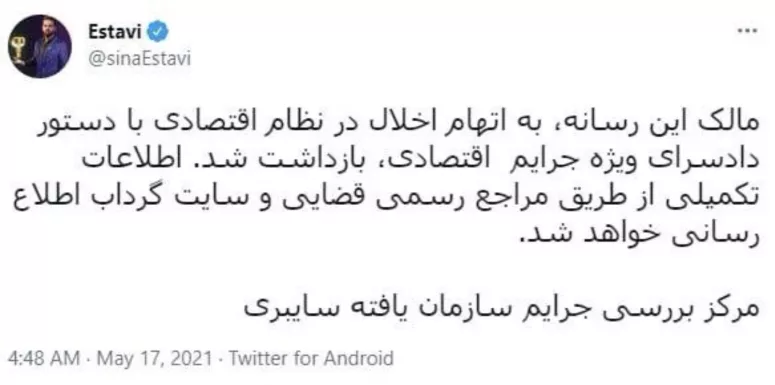The influential crypto figure has seen previous allegations of wrongdoing along with these current charges.
Introduction
Sina Estavi, the man behind the $2.6 million purchase of Jack Dorsey’s first tweet as an NFT, was arrested in Iran on allegations of causing economic disruption. A tweet on Monday morning through the verified account of Estavi confirms the arrest. The tweet was subsequently removed hours later, sparking speculation the Tweet was made by Iranian authorities.
Estavi, the CEO of Bridge Oracle was arrested by the Iranian Cyber Police. The native token of Bridge Oracle, BRG, took a massive dive after the news broke.
The Alleged Crime
The information that was made available by the authorities in regards to the case points towards economic disruption, as the arrest was ordered through the Special Court for Economic Crimes. Estavi in his Twitter biodata pinned his location in Malaysia, although he is of Iranian descent and has been linked to activities in and out of Iran. Estavi is no stranger to controversies; Mate Tokay, the former CEO of Bitcoin.com, sued Estavi for unpaid services amounting to 37.5 million BRG tokens. Tokay acted as an advisor for the Bridge project that successfully raised funds for the project’s Initial Exchange Offering
More Allegations
Iranian crypto researcher Kave Moshtaq wrote that he was assaulted after going to court in relation to a complaint against Estavi. The Tweet contained a picture of Moshtaq with blood on his face, purportedly a result of the assault that was meant to intimidate him. The Iranian Blockchain Development Association, after receiving numerous complaints against Estavi and the companies that he controls, requested for further particulars and documentations but was denied their request. While it is uncertain whether these events played a role in the arrest, they are certainly citable as possible contributing factors.
What Amounts to Economic Disruption?
The Iranian authorities has in the past doled out severe punishment for those convicted of crimes categorized as ‘disrupting the economy’. In 2018, two financial traders dubbed the ‘Sultan of Coins’ were sentenced to death for illegal currency trading. The traders had hoarded gold, with the charges being that they were planning on manipulating the Iranian economy with their stash. With the heavy sanctions imposed by the United States, economic pressure is mounting on the Iranian government. Activities affecting the economic and the financial fabric of Iran can be classified as economic disruption, and cryptocurrency is not immune to being considered disruptive.
Effect on Rest of Industry
Governments and regulators around the world are becoming very concerned at the speed of adoption of cryptocurrencies. Because only a small percentage of investors fully understand the intricacies of the technology, the less-informed place themselves in a very vulnerable position to be exploited. Crackdowns and increased regulatory scrutiny on crypto exchanges in Turkey has forced the cessation of operation for Thodex and Vebitcoin. China also recently reiterated its 2013 and 2017 bans of cryptocurrency exchanges, which has had a dramatic effect across the Binance Smart Chain. Anybody involved in the crypto landscape needs to stay on top of legal and regulatory developments in their country, as there can be exploitation committed by even notorious figures like Estavi,
Source : bsc.news

Founded in 2020, BSCNews is the leading media platform covering decentralized finance (DeFi) on the Binance Smart Chain (BSC). We cover a wide range of blockchain news revolving mainly around the DeFi sector of the crypto markets. BSCNews aims to inform, educate and share information with the global investment community through our website, social media, newsletters, podcasts, research, and live ask me anything (AMA). Our content reaches hundreds of thousands of global investors who are active in the BSC DeFi space.
BSC NEWS is a private news network. All posts posted by this user belong 100% to bsc.news All rights are reserved to BSC NEWS for more information about BSC NEWS contact BSC NEWS HERE.





